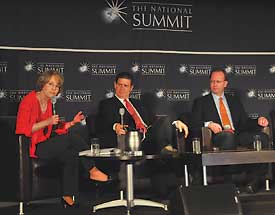President Mary Sue Coleman joined national business leaders to promote the idea that risking and being willing to accept failure is necessary if the U.S. wants to promote entrepreneurship.

It is only through trying new ideas, and learning from them if they don’t work out, that success ultimately is achieved, agreed members of a panel on technology and innovation Tuesday at The National Summit in Detroit.
“Somehow, we’ve got to get over this notion that if somebody fails at something, they go into the hall of shame. You go onto the next thing,” Coleman said. “We must show by our actions that, yes, we are willing to invest again.”
Joining Coleman on the panel were James Turley, CEO of the accounting firm Ernst & Young; Anders Gustafsson, CEO of Zebra Technology Corp.; and Eva Chen, co-founder and CEO of Trend Micro Inc.
Participating on other panels at the summit were Coleman’s fellow university presidents from the University Research Corridor: Wayne State University President Jay Noren and Michigan State University President Lou Anna Simon. The URC was a sponsor of the summit.
The National Summit was convened by the Detroit Economic Club to bring together a broad spectrum of America’s leaders for a discussion on ways to increase U.S. competitiveness in the global marketplace. It ran last Monday through Wednesday.
Panel members agreed that for America to compete, it needs an entrepreneurial spirit, which means people taking the calculated risks must be rewarded and supported at all levels.
And businesses must acknowledge the value of collaboration as much as competition. Creating partnerships across the globe ultimately will strengthen American businesses, Turley said.
“This is not the Americanization of the world. This is lifting each other,” he said.
After the session, Coleman said she was encouraged by the fact that, whether they came from the world of business or higher education, panel members shared the same basic goals for a culture change needed to foster innovation.
“What I’m always taken with is how much commonality there is between running a business and running a big university,” she said.
Coleman also stressed three points about higher education’s role in promoting innovation in business:
• Research universities can be hubs for entrepreneurial activity and technology innovation, but such activity must be guided, nurtured and rewarded by campus leaders.
• The state has a vital assistance role to play by investing in and promoting higher education, and by recognizing graduates as a resource.
• Universities must help link internal activities and ideas with businesses to catalyze economic expansion and help diversify commercial activity.
U-M promotes entrepreneurship through a variety of units and programs, including 100 courses that engage in such activity, she said.
Students want to start businesses and U-M must do what it can to help them, Coleman told the audience at Detroit’s Renaissance Center. Other panelists agreed that attitude is important during times of economic challenge, which often offer the greatest opportunity for new ideas to take off.
Chen cited the example of her Internet security company, which she and two others founded in 1988 during the Asian economic crisis. “No one wanted to give us money,” she said. But they persisted and their company has grown to employ 4,000 people in 38 offices worldwide.
“I think we are in the perfect time in the history of this country to encourage this kind of opportunity,” added Coleman.

